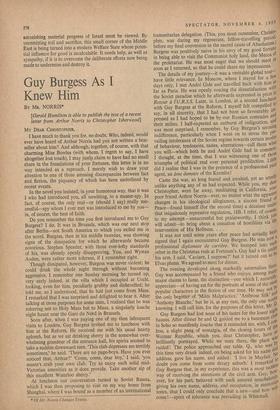(2)' With her Neighbours
By L. F.. RUSHBROOK WILLIAMS Nor is it only in the countryside that there is visible evidence of successful energy. The growth of new industrial establish- ments, great and small, round Tel Aviv and Haifa is equally impressive. The chemical factory which handles the phos- phates of the Negev is now in full production. The use of electric power in industry has tripled since 1949, and is still rising steadily. Slowly but surely, the balance ot payments position—always the weak point of Israel's economy—is im- proving, as local production expands and export markets are built up. The country is becoming more self-sufficient in food supplies. The battle :is by no means won; but to talk to the men who are responsible for its conduct is to gain a vivid impression of cautious optimism unmixed with complacency.
These men are determined that the country shall stand upon its own feet economically, and that it must be made to do so before the loans upon which the drives for industrial and agricultural development are based, fall to be repaid. There is a race against time as well as against other obstacles, such as the economic blockade imposed on Israel by the Arab States. It was commonly supposed that the real difficulty in building up the new State would be to persuade a race whose traditions are primarily urban, commercial and professional, to take up the pioneering life uppn the land which offered the sole hope of making Israel viable—and defensible. Experience has reversed these expectations. The balance of population between town and country is steadily tilting in favour of the latter. Idealism, enthusiasm and intelligence are converting urban-born Jews into tough, hardy and successful farmers.
Situated as Israel is, it is scarcely to be wondered at that her great longing is for peace, upon the maintenance of which all her hopes fot the future depend. There is no responsible political party favouring a 'preventive war.' Even the extreme Right-wing Heruth, which regained in the last elections the position which it held in the first Knesset, made 'peace' its main slogan. The old revisionist claims for the expansion of Israel territory, so often quoted by Arab statesmen in justifica• tion of current suspicion of Israel's intentions, now command no support. Israel only wants to be left alone to cultivate her own lands and to play her part in building up the economic prosperity of the region in which her lot is cast. Those who believe that she may be 'biding her .time' to attack her enemies at a disadvantage are mistaken. Her outlook is purely defen- sive: and her anxieties spring from a knowledge of the vast gap between her own modest resources and the material advantages in manpower and wealth enjoyed by the Arab States around her. , Again and again when talking to Israelis, • the foreign observer is impressed by the strength of their conviction that the Western Powers persistently underrate the depth and implacability of Arab hatred. Here in Israel, no one believes the comfortable Western theory that Egyptian, Syrian and Saudi Arabian leaders are only talking for internal consume- tion. Israelis have first-hand experience of their Arab neigh- bours' real feelings towards them in the ,numerous border incidents which give the Mixed Armistice Commissions so much trouble. These incidents are quite easily stopped—as the improved situation on the Jordan and Lebanon borders shows —when the Government concerned finds it expedient to dis• courage them. When they multiply in numbers and seriousness, Israelis argue that there is purpose behind them. Nor is con' firmation lacking. The Arab press and radio constantly praise the exploits of saboteurs sent into Israel.
It is firmly believed in Israel that the Egyptian Government, anxious to regain the prestige lost by the emergence of the Turkey-Iran-Iraq-Pakistan bloc and by the failure of its efforts to dragbon the Sudan into subordination, is only biding its time to make a new bid for the leadership of the Arab world by attacking this country. The fear is commonly expressed that the Western Powers may now still further strengthen Colonel Nasser's hand by offering him additional assistance to wean him from his new ties with the Soviet bloc. Should this happen. his prestige will be immense: and the prospects of restraining him from the kind of action which Israel believes that he is contemplating will be weakened. The reply which Israel would like to see to the Czechoslovakian arms deal is an announce- ment that for every piece of heavy war equipment which Egypt receives, Israel will be given facilities for receiving the equiva- lent from Western sources : but a step so decisive would argue a stiffening of British and American handling of Middle Eastern problems for which in the estimation of people here there is so far little evidence.
It is against the background of these anxieties that the astonishing material progress of Israel must be viewed. By unremitting toil and sacrifice, this small corner of the Middle East is being turned into a modern Welfare State whose poten- tial influence for good is incalculable. It needs help, as well as sympathy, if it is to overcome the deliberate efforts now being made to undermine and destroy it.











































 Previous page
Previous page